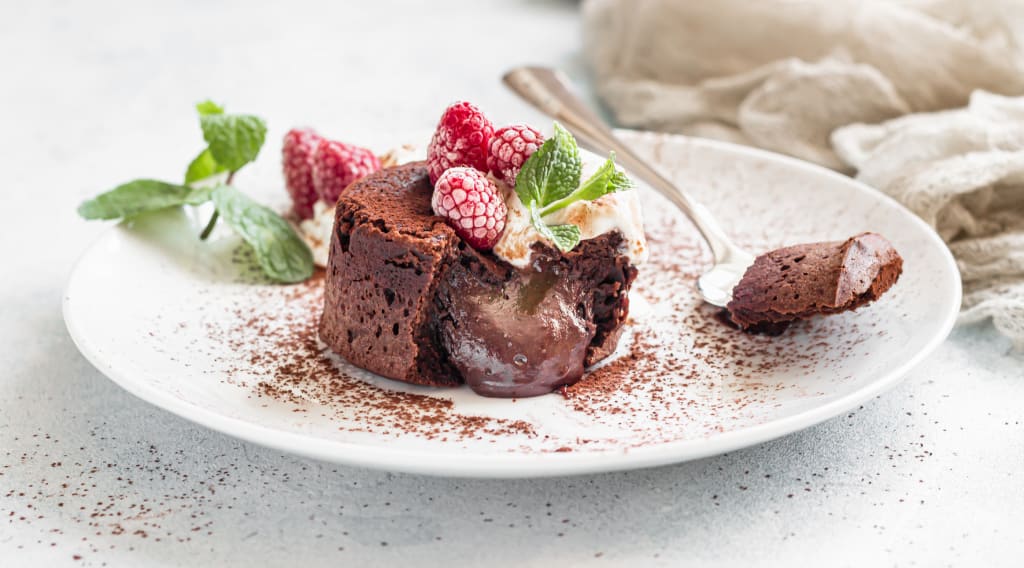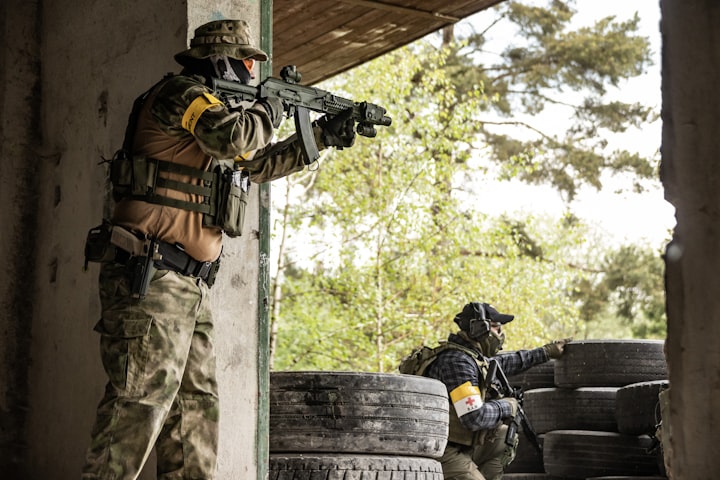A Cup of Sugar
The (bitter)sweetness of solitude.

In the olden days, she would have been called a witch.
She lived alone in a cottage on a plot of green land by the Seine. Her days were spent in the company of the bees and the chickens she tended. As evening drew near, her knees were always brown from the dirt of her garden, where she grew potatoes and carrots and fresh herbs for her dinner table.
The world was quiet here. That's what she loved the most.
As summer drew to an end and the heat of the day paled to breeze-kissed coolness in the evenings, she felt the urge to have a small celebration. The raspberries were plump and glowingly rosy, and would make a feast with a fresh chocolate soufflé.
On the morning of the first of September, she awoke to the cooing of doves and eased herself from bed. The sheets crisply remade, she prepared a quick breakfast of newly-laid eggs and home-baked bread, then poked her head into her pantry.
The shelves were nearly nude, stripped of the cans, jars, and sacks that once filled the small room to bursting. She could replenish the preserves herself, from the trees and bushes and earth in neat rows behind her house. But she didn't grow the wheat to make her own flour, nor the cacao trees for chocolate.
She'd have to make a pilgrimage into Paris if she was to make a soufflé.
A bright yellow bicycle leaned against the wall just outside the Dutch door of her cottage. It wasn't chained up; she didn't fear any thief worse than the foxes who tried to steal into the chicken coop in the dead of night.
The broad baskets nestled between the handlebars and atop the rear tire were plenty spacious to accommodate the supplies she'd bring home.
She swept the breakfast crumbs off the kitchen table, wrapped the remaining loaf of bread in a cloth, and slipped a sturdy pair of work shoes onto her feet. Before she left, she tugged a heart-shaped locket from one of the coat pegs by the door.
It slipped easily over her head.
She popped the small latch that kept it shut, revealing a faded photo of her husband, dead these six months. Her finger pressed against her puckered lips and then tapped the photograph, christening it with a chaste kiss.
She never left home without her husband.
Tucking the locket into her blouse, she strode out the front door and slung her leg over the bike, perching herself on the narrow seat.
The drive leading up to her modest cottage was gravel which crunched under her wheels as she pushed herself, teetering on her tiptoes, to the road.
Where gravel hugged the pavement of the main road, she finally pressed one foot against a pedal and propelled the bike forward. The chain was well-oiled just for occasions like this.
She didn't often go into the city, preferring her own quiet company, but she was well-prepared for the instances that drove her there.
The ride into Paris took little over an hour. The small, provincial town of Bougival was much closer, but she couldn't bear to run into the faces of those she knew.
In Paris, everyone was anonymous.
The whole way there, the road leading out of Paris was densely clogged with cars, their chrome blindingly bright in the sun. So many people eager to get out of the city.
The road into Paris, on the other hand, was deserted. One abandoned car sat dejectedly on the gravel shoulder, its occupants missing. No doubt they were off in search of assistance.
She pedaled on, until the soaring, balconied buildings of Paris loomed up to swallow her whole. Of course, the buildings were only three stories tall—aside from the Eiffel Tower piercing the sky in the distance, of course—but compared to the small, contained world in which she lived, they could have been towering skyscrapers.
Her nose wrinkled the farther into the city she cycled.
Paris was an odorous town at the best of times, and the stench rose up as if threatening to choke her with its fists.
More cars filled the city's streets, metallic clots in the arteries of Paris. She stuck mostly to the sidewalks, ogling the detritus of urban life distastefully.
Litter blanketed the pavement, crunching under her wheels when she couldn't avoid it. Water-stained sheets of newspaper, all proudly proclaiming pessimistic press for their patrons. Crumpled paper masks, once blue but now muddied from the gutters. The wrappers from the non-perishable goods that sustained the world when industry turned their noses up at fresh foods and the farms that produced them, in the mid-60s.
She was reminded of exactly why she and her husband got out of the city, just over a year ago. He still commuted to Paris for work, but he was set to quit his job a mere week before he died.
Her preferred market was only fifteen minutes into the city limits of Paris, and she squeezed her bike's brakes gently as she came up to the store. The sliding doors were propped open and a stack of plastic baskets stood sentry at the entrance.
She popped the kickstand down and left the bike in the shade of the building, then grabbed a plastic basket and strode into the store.
The well-organized aisles were familiar to her and she navigated easily through them, grabbing a bag of flour, bricks of quality chocolate, a few pods of vanilla, and some other bits and bobs. A metallic gleam caught her eye on the way out of the store. It didn't fit in with the plastic bins filled with aromatic spices that filled this aisle of the market. Examining it closer, she grabbed the metallic object and added it to her basket as well.
When she was finished, she shifted all the goods from the store's basket to the wire baskets hanging from her bike. It took a few moments to get the balance right so she wouldn't careen off the road when she got started, but finally everything was loaded up and strapped in.
She deposited the plastic basket neatly atop the stack outside the store, remounted the bike, and aimed for home.
Although she was leaving Paris, she chose to ride on the side of the road leading into Paris. It was still devoid of cars and sure to be for a long while yet.
The ride back to her small, quaint cottage was uneventful. Almost.
It wasn't until she cycled past the lone abandoned car on the road into Paris that her eye caught something she was keen to avoid every time she had to leave her home.
The car wasn't abandoned after all, as she had first thought.
Instead, the driver was slumped over the wheel, its clothes dark enough to blend into the black car interior when looking at the vehicle through the back window. But now, seeing it from the front, she could see the driver's face.
What was left of it.
It was clear that the driver was long-dead. Very little of its skin remained on its face. After having stewed in a hot car for so many months, she knew the rest of the skin had rotted into goo and sloughed off in its own time. Most of what was left was an eyeless skull.
The gleam of bone made her feel sick.
Worse than that, it made her eyes rove.
The traffic on the way out of Paris wasn't so much traffic as a traffic jam that would never be cleared. So many people trying to get out of the city, after the virus struck.
So many people dead, their final resting places the vehicles they tried to escape in.
If she didn't look too closely, she could almost imagine that they were travellers on their way to a summer vacation, trying to escape the heat of the city.
Now, all she could see were the skulls of the dead, their empty eye sockets peeking out at her from behind their windows.
She hadn't seen another person alive in six months, since the morning her husband left for work as if it was just another day. The virus was bad by then, but he wanted to finish out his last week of work anyways.
He had called later that afternoon to tell her he was sick and wouldn't be coming home, lest he pass the virus on to her. He told her he loved her, and that was that, and all she was left with was a heartless, heart-shaped locket to remember him by.
On her first trip into Paris to get supplies, she had a notion of cycling to his office, to take his body home and put it to rest properly. But the deeper into the city she got, the more bodies there were. She just couldn't stomach it, even now.
She spat angrily onto the ground, mad at the world for dying around her and leaving her by herself. She liked to be alone, but for the first time in her life, she felt lonely.
Trying to put such thoughts to rest, she cycled the rest of the way home, unloaded her groceries in the pantry, and set to work on her soufflé.
Mercifully, the small cottage was somewhat of an antique—it had a working well in the yard, and a wood-burning stove.
She dug out the old, stained cookbook that once belonged to her grandmother and flipped it open to the correct page.
It was only a matter of minutes to grease the ramekins, chop and melt the chocolate, sift the flour, and crack the eggs. She grabbed the bag of sugar from the pantry but, when she tipped it over her measuring cup, a pitiful trickle dusted out.
She stared the small heap of sugar, barely a spoonful. The tears came before she even knew they were welling up. They were bitter and plentiful, carrying the full weight of her loss.
She missed her husband, she missed her friends.
She missed watching lovers tangled up as they walked down the shores of the Seine.
She missed the roar of cars on the main road, and the wails of children who had dropped their ice cream cones.
Perhaps, most of all, she missed the days when you could pop over to the neighbour's house to borrow a cup of sugar when you ran out while making a soufflé.
The tears spilled for hours. When they were finally spent, she went to bed.
She hadn't eaten since breakfast, but she wasn't hungry.
Perched on a mound of pillows, with the blankets drawn up to her chest, she drew the heart-shaped locket from around her neck.
As she had that morning, she popped the latch and pressed a kiss to her husband's photograph through the tip of her finger.
She set the open locket on the bedside table, gazing longingly at it, then opened the top drawer of the table.
A metallic gleam spilled from the opening. The same gleam she saw in the market earlier in the afternoon. She wrapped her hand gingerly around the object and pulled it from the drawer, revealing a gun.
No doubt someone had tried to loot the market with it, before realizing they could simply take what they wanted, and leaving the weapon behind.
She set the gun atop the table, next to the locket.
Her eyes looked from the locket to the gun, then back.
The world was quiet here. That's what she hated the most.
About the Creator
Rhiannon Lotze
Rhiannon Lotze is a Canadian author from Windsor, Ontario, which means she's 97% maple syrup and 3% Timbit. Her published works include the short stories Barrens and Brine, and Non-Prophet, and the short story collection Of Gods and Myth.






Comments
There are no comments for this story
Be the first to respond and start the conversation.